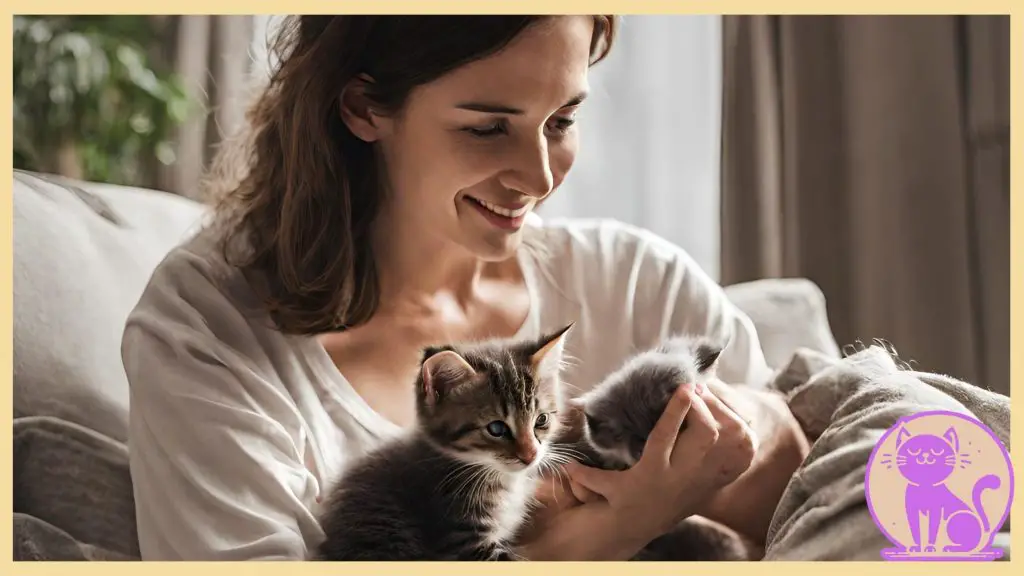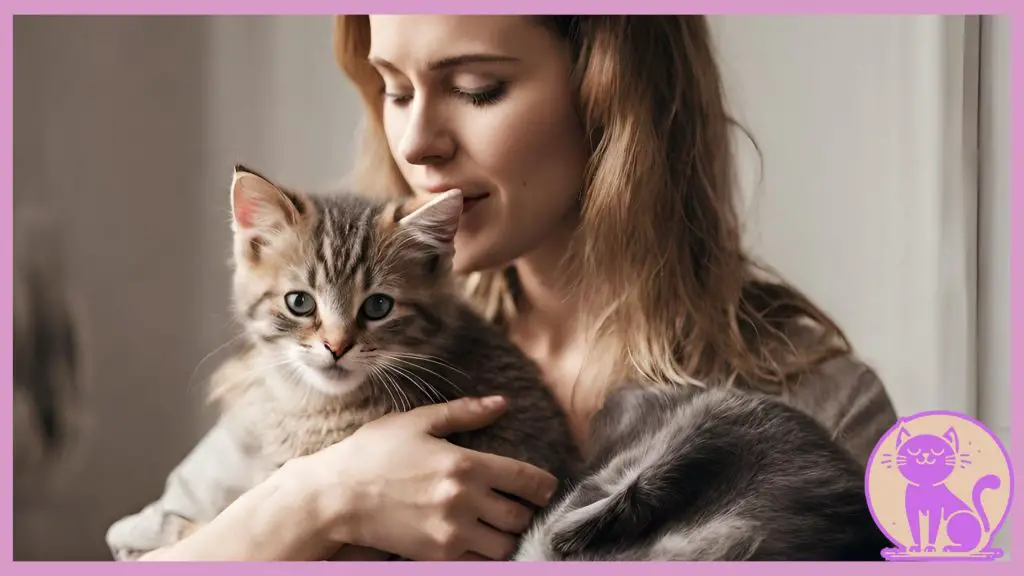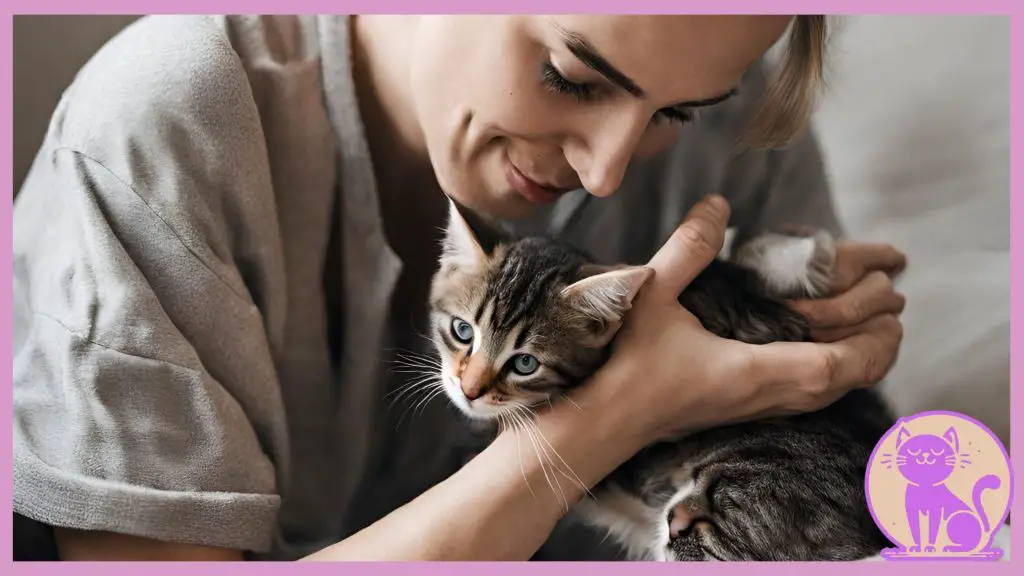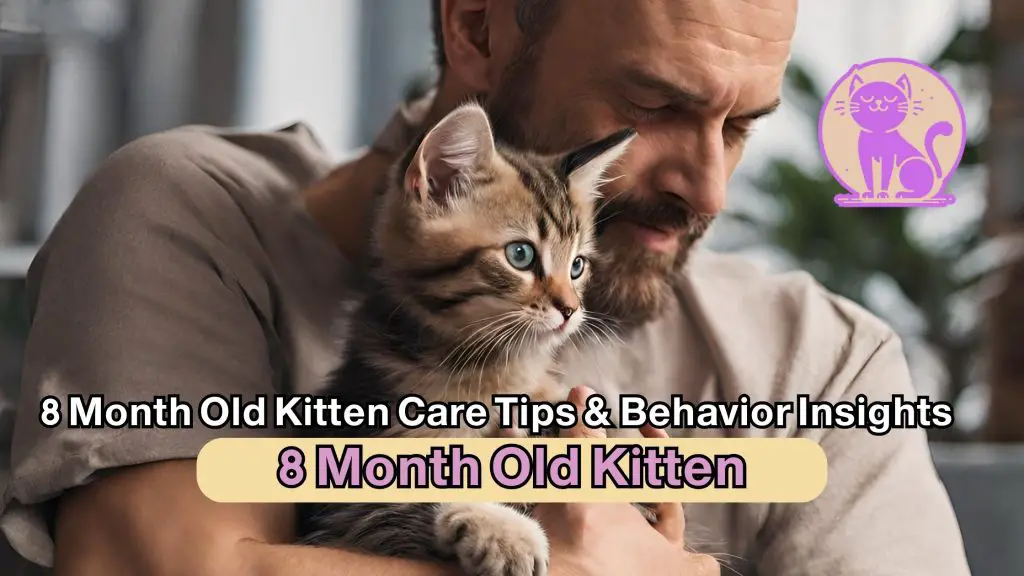At eight months old, a kitten is at an exciting crossroads of growth and discovery. This period in their development shines a spotlight on the subtle intricacies of kitten care that discerning pet parents are eager to master. From understanding the evolving aspects of kitten behavior to adapting to their nutritional needs, our guide dives into what makes this age so unique. Whether you’re a new guardian of a furry friend or looking to refine your care technique for your 8-month-old kitten, our insights aim to foster a deeper bond and ensure your pet’s well-being as they continue on their journey towards cat adulthood.
Understanding Your 8 Month Old Kitten’s Development

As your kitten approaches the eight-month mark, observing their growth and shifts in behavior provides not only joy but also essential insights into their health and needs. During this phase, kittens undergo significant physical and behavioral development, with each playful leap and curious paw signaling important milestones. Gaining an understanding of these kitten behaviors, their playtime habits, and the physical benchmarks they should be reaching, will help you provide the best care for your young feline companion.
Physical and Behavioral Milestones
Your energetic eight-month-old kitten is likely showcasing increased agility and strength. Typical kitten milestones around this age include a near-adult size in terms of weight and length, though they will continue to fill out and gain muscle. You might also notice a sharpening of their hunting instincts during play, an important sign of a kitten’s maturing behavior and cognitive development.
The Importance of Play in Development
Engaging in regular kitten playtime is more than just fun—it’s a crucial aspect of their development. Playtime is where kittens learn coordination, timing, and social cues. It’s also the foundation for establishing a strong bond between you and your pet. Toys that mimic prey, such as feather wands or small balls, can be particularly beneficial in honing their natural predatorial instincts in a controlled environment, contributing to a well-adjusted and physically fit kitten.
Recognizing the Signs of Puberty
Alongside the expected developmental leaps, an eight-month-old kitten may begin to exhibit signs of puberty. This can include behavioral changes like increased territoriality, vocalization, and even attempts to spray or mark their territory. Recognizing these signs early allows for timely discussions with your vet about the potential for spaying or neutering, reducing the risk of unwanted behaviors and contributing to your kitten’s overall well-being.
Kitten Nutrition: Fueling Growth and Health
At eight months old, kittens are in a critical phase of development where proper nutrition is vital to their health and well-being. Ensuring that your feline friend receives all the necessary nutrients can support their continuous growth and help stave off potential health issues.
Selecting the perfect balance of wet and dry food is one of the most crucial decisions in kitten nutrition. While wet food can offer hydration and is often more palatable, dry food can be beneficial for a kitten’s dental health and is convenient for portion control and free-feeding.
- Wet Food: High moisture content, can aid in hydration, often more tempting for picky eaters.
- Dry Food: Convenient for grazing, supports dental health, typically more calorie-dense.
Vital nutrients are the cornerstone of a healthy diet, contributing to robust immune systems and vital energy levels. The following table outlines the essential nutrients necessary for optimal kitten development and health, as well as considerations to keep in mind while choosing a diet.
| Nutrient | Benefits | Recommended Sources |
|---|---|---|
| Proteins | Builds muscle and supports growth | Meat, fish, eggs |
| Fats | Provides energy, assists in cell function | Fish oils, animal fats |
| Carbohydrates | Energy, aids digestion | Whole grains, vegetables |
| Vitamins | Supports immune health and metabolism | Fruits, vegetables, commercial kitten foods |
| Minerals | Promotes strong bones and teeth | Meats, commercial kitten foods fortified with minerals |
| Water | Essential for all bodily functions | Fresh water, wet food |
The frequency and quantity of feeding are also fundamental factors in maintaining your kitten’s health. At eight months, most kittens will do well on two to three meals a day. It’s important to follow feeding guides provided by food manufacturers but also tailor portions to your kitten’s specific activity level and growth needs.
Remember: Every kitten is unique, and dietary needs can vary. Consult your veterinarian to tailor a nutrition plan that best supports your kitten’s health and development.
Comprehensive Kitten Health and Wellness

Attentive care for your kitten includes a meticulous approach to their health and well-being, especially during the pivotal months of growth and development. From kitten vaccinations to regular health checks and the critical decision of spaying and neutering, let’s dive into how to best ensure your furry friend’s vibrant health.
Vaccination Schedule and Importance
Kitten vaccinations play a fundamental role in safeguarding your pet from infectious diseases. A well-planned vaccination schedule, tailored by your veterinarian, not only promotes kitten health but also contributes to the wellness of the pet community at large:
| Age | Vaccine | Protection Against |
|---|---|---|
| 6-8 weeks | FVRCP (1st dose) | Feline Viral Rhinotracheitis, Calicivirus, Panleukopenia |
| 12 weeks | FVRCP (2nd dose) | Feline Viral Rhinotracheitis, Calicivirus, Panleukopenia |
| 16 weeks | FVRCP (3rd dose) & Rabies | Core diseases & Rabies virus |
Common Health Issues to Watch Out For
Young kittens are prone to several health concerns, and being vigilant about common symptoms can lead to prompt treatment. Be on the lookout for signs of:
- Upper respiratory infections
- Digestive troubles
- Parasitic infections
- Feline leukemia (FeLV)
Consult your veterinarian when any unusual signs arise to address kitten health issues at the earliest.
The Spaying or Neutering Decision
The choice to spay or neuter your kitten is a significant one, impacting not just population control but also preventing certain health risks. Spaying a female kitten can help in preventing uterine infections and breast tumors, while neutering a male reduces the risk of testicular cancer. Additionally, these procedures can lead to more stable and calm behavior. Let’s compare the best times for these surgeries:
| Procedure | Recommended Age | Health Benefits | Behavioral Benefits |
|---|---|---|---|
| Spaying (Female) | Before 5 months | Prevents uterine infections, breast tumors | Less likelihood of wandering |
| Neutering (Male) | Before 5 months | Prevents testicular cancer | Decreases aggressive behavior |
The Purr-fect Environment: Creating a Kitten-Friendly Home

Welcoming a kitten into your family involves more than just providing love and affection; it requires creating a kitten-friendly environment that meets their developmental needs. Essential to kitten care is establishing a safe and nurturing space where they can explore, play, and rest. Here are some tips to ensure your home is ready to cater to your furry friend’s boundless curiosity and energy.
- Kitten-Proofing: Start by securing loose wires, tucking away household chemicals, and removing small objects that could be swallowed. Always keep your toilet lids closed to prevent any curious dips!
- Play Area: Dedicate a specific area for your kitten to play with a variety of stimulating toys. This addresses their play instincts and keeps them engaged.
- Resting Zone: Ensure there’s a quiet, comfy spot for your kitten to nap undisturbed. Cat trees with integrated beds are excellent for this purpose.
- Climbing Solutions: Cats love vertical spaces, so provide plenty of shelving or cat furniture for climbing. This also helps keep them away from places you’d rather they not go.
- Scratching Posts: To protect your furniture, invest in scratching posts or pads. This natural behavior helps kittens shed claw sheaths and stretch their bodies.
- Quiet Retreat: Finally, create a secluded area where your kitten can feel secure and retreat when overwhelmed, a crucial aspect of kitten care.
Remember, a kitten-friendly environment is one that allows for both energetic play and peaceful rest. Balance is key to a happy, healthy kitten.
Kitten Behavior and Socialization Techniques
As guardians of young felines, it’s essential to discern the normal patterns of kitten behavior and how they can be shaped through thoughtful socialization techniques. At eight months old, a kitten teeters on the brink of adolescence, making this a critical time for reinforcing positive interactions and behavioral foundations. This section will delve into the nuances of feline social development and offer practical advice for nurturing a sociable and well-adjusted pet.
- Introducing Your Kitten to New Experiences:
- Expose kittens to different people, pets, and environments gradually.
- Keep initial socialization sessions short, positive, and controlled.
- Always supervise interactions with other animals to prevent negative experiences.
- Recognizing and Addressing Behavioral Issues:
- Watch for signs of aggression, fear, or anxiety during encounters.
- Reward calm and friendly behavior with treats and praise to reinforce these actions.
- Consult a veterinarian or a behaviorist if persistent behavioral problems occur.
- Utilizing Play and Positive Reinforcement:
- Engage kittens in interactive play that stimulates their minds and encourages good behavior.
- Implement consistency in rewarding positive interactions to help shape behavior.
- Avoid physical punishment and instead redirect unwanted behavior using toys or treats.
Understanding and influencing kitten behavior through appropriate socialization techniques can greatly impact your pet’s ability to form lasting, positive relationships with humans and other animals. The investment in time and patience during this primary stage can lead to a harmonious household and a well-adjusted adult cat.
Interactive Kitten Playtime and Exercise Essentials

Kittens are bundles of energy, and incorporating interactive playtime and exercise into their daily routine is crucial for their development, happiness, and health. Not only is playtime with your furry friend a joyous bonding experience, but it also ensures they stay physically fit and mentally stimulated. Let’s dive into how you can enhance your kitten’s playtime and encourage a lifetime of well-being.
The Best Toys for Your Kitten’s Age and Stage
Choosing the right toys for your 8-month-old kitten is important to ensure that their playtime is both safe and developmentally appropriate. At this age, kittens crave toys that mimic their natural hunting instincts and provide a variety of sensory experiences. Think interactive toys such as laser pointers, feather wands, and perhaps a tantalizing puzzle feeder that will engage their brains while they strive to get to the treats inside. Always ensure that toys are durable and free of small parts that could become choking hazards.
Setting Up Playtime Routines
Consistent playtime routines are key for structured kitten exercise and behavior. A daily schedule helps your kitten burn off excess energy and reduces potential behavioral issues. Try to initiate play at around the same time each day, creating a routine that your kitten can anticipate and look forward to. This could include a mix of independent play with toys they can chase or bat around, combined with interactive play where you’re directly involved, be it with a string toy or a chase game. Remember, even a simple cardboard box can become an engaging playtime adventure for an inquisitive kitten.
Safe Outdoor Activities
Introducing your kitten to the great outdoors can be a thrilling way for them to explore and exercise, but it’s important to do so safely. Consider a harness and leash to enjoy the outdoors together. Or, if you have a secure backyard, supervised exploration time can be a treat. There are also specially designed ‘catio’ enclosures that allow your kitten to enjoy fresh air and sunshine while keeping them safe from hazards. Whatever outdoor activities you choose, ensure they’re controlled and safe for your kitten to prevent any risk of injury or escape.
Grooming and Hygiene for Your 8 Month Old Kitten
As your kitten approaches its first year, establishing a regime for kitten grooming and hygiene is essential for its well-being. Good habits formed at this stage will set the foundation for lifelong health and comfort.
Brushing and Coat Care
Maintaining your kitten’s coat requires regular brushing to reduce hairballs and matting. Select a brush suitable for your kitten’s fur type and gently accustom your pet to this routine, turning it into a bonding experience. Short-haired breeds may only need weekly brushing, while long-haired kittens benefit from daily attention.
Dental Health: Starting Oral Care Early
Introducing your kitten to dental health practices early on can prevent tooth decay and gum disease. Begin with soft brushing, using a kitten-friendly toothpaste, to get your kitten used to the feeling. This will contribute significantly to its overall health.
Litter Training Refresher Tips
Even if your kitten has been litter trained, reinforcement is key, especially during the playful exploratory stage at eight months old. Ensure the litter box is always clean and placed in a quiet, accessible location. If any accidents happen, it’s important to revisit litter training basics with patience.
| Grooming Task | Frequency | Tips |
|---|---|---|
| Brushing | Daily/Weekly | Use the appropriate brush; start gently and reward your kitten. |
| Dental Care | Few times a week | Introduce slowly with pet-safe toothpaste; reward after each session. |
| Nail Trimming | Every 2-4 weeks | Trim carefully while your kitten is relaxed; consider a vet or groomer if unsure. |
| Bathing | As needed | Use mild kitten shampoo; make the bath short and sweet. |
| Litter Training | Daily monitoring | Keep the box clean; place in a private, consistent spot. |
Remember, creating a positive routine for grooming and hygiene will not only help keep your kitten clean but also serves as an opportunity for you to spot early signs of any potential health issues. Be patient, be consistent, and enjoy the quality time with your growing companion.
Training and Discipline for an 8 Month Old Kitten

When it comes to kitten training and promoting good kitten discipline, understanding the mindset and needs of your feline friend is crucial. At 8 months old, kittens are ready to learn important life skills that will help them thrive within your family dynamic. This developmental stage offers a unique opportunity to instill manners and obedience using compassionate methods.
Positive reinforcement is a cornerstone in effective kitten training. Praising or rewarding your kitten when they exhibit desired behavior not only strengthens that behavior but also fosters a bond of trust between you and your pet. Consistency in your training approach is key, as kittens learn best through repetition and routine.
Punishment is not a part of effective training and can lead to stress and behavioral problems. Instead, redirecting your kitten’s attention to appropriate activities offers a stress-free way of discouraging unwanted behaviors.
- Use of Treats: Offer treats to encourage good behavior, but in moderation to avoid overfeeding.
- Playtime: Enriching play can be a form of reward and helps to prevent destructive behavior.
- Voice Commands: Using a firm and calm voice can guide your kitten to understand basic commands.
- Clicker Training: This method uses a clicker to signal when your kitten does something correctly, followed immediately by a reward.
Training your kitten requires patience and understanding that progress might not happen overnight. Dedication to daily, short training sessions will prove most effective, encouraging development and strengthening your kitten’s discipline over time.
| Behavior | Discouragement | Encouragement |
|---|---|---|
| Scratching Furniture | Provide scratching posts and pads; use double-sided tape on furniture to deter scratching. | When the kitten uses the scratching post, offer praise and occasional treats. |
| Jumping on Counters | Keep counters clean of food and use clicker training to teach off commands. | Provide cat trees and designated high perches to satisfy the kitten’s climbing instincts. |
| Inappropriate Litter Use | Ensure the litter box is clean, accessible, and in a safe location. | Whenever the kitten uses the litter box correctly, respond with positive reinforcement. |
In conclusion, by harnessing the power of positive reinforcement and understanding the needs of your 8-month-old kitten, you can lay the foundations for a well-behaved and affectionate companion. Always remember, the love and patience you invest in kitten training and discipline will be returned tenfold by your furry friend.
Conclusion
As we reach the end of our comprehensive guide, you now possess the enriching knowledge needed for successful 8 month old kitten care. You’ve learned how to cater to their playful spirit and ever-growing curiosity, navigating the fascinating developmental stage that teems with unique milestones. With insights into nutrition, health, environment, and behavior, you are equipped to provide the nurturing your young companion thrives on.
Summary of 8 Month Old Kitten Care Essentials
Recapping the essentials, we covered the significance of a balanced diet tailored for your kitten’s rapid growth, the vaccination routines crucial for long-term well-being, and the joys of creating a stimulating living space. Integrating socialization and play into your kitten’s daily life not only strengthens your bond but is imperative for their physical and cognitive development. Each of these components forms a robust foundation for your kitten’s journey into adulthood.
Continued Learning and Adaptation
Our attentive care doesn’t end here, as continuous learning and adaptation are crucial components of kitten care. As they progress past the 8-month mark, be prepared to adjust your approach to match their evolving needs. Observing and responding to changes in behavior and health underscores the commitment to their lifetime welfare, ensuring a balance between encouragement and discipline as they mature.
Enjoying the Journey with Your Growing Kitten
Amidst all the practical advice, never lose sight of the joy in the shared moments with your furry friend. Each leap in their growth, each purr, and every playful pounce is a precious memory in making. As you and your kitten reach new milestones together, the bond between you will deepen, shaping a companionship that delights and enriches both lives. Keep cherishing the journey of 8 month old kitten care, as their milestones become cherished chapters in your life together.
FAQ
Q: How do I know if my 8 month old kitten is developing properly?
A: You can assess your kitten’s development by observing milestones such as growth in size and weight, behavioral changes, and the onset of puberty, which may include increased territorial behavior and vocalization. Regular check-ups with a vet will help ensure your kitten is on the right track.
Q: What type of play is important for my 8 month old kitten’s development?
A: Interactive play that stimulates your kitten’s hunting instincts is very important. This includes using toys like feathers on a string, laser pointers, and other objects that mimic the movement of prey. Playtime is also a key factor for social development and bonding with you.
Q: What are the signs of puberty in an 8 month old kitten?
A: Puberty in kittens can start as early as 6 months old. Signs include increased territorial marking, vocalization (such as yowling in females), and for males, the development of jowls and the urge to roam. Female kittens may go into heat, showing behaviors such as excessive meowing, rubbing, and displaying a receptive posture.
Q: How should I feed my 8 month old kitten to ensure proper nutrition?
A: Your kitten should be eating a balanced diet of high-quality kitten food that’s rich in protein, fats, and essential vitamins and minerals. Ideally, a combination of wet and dry food should be provided, and you should adhere to the recommended feeding schedule and portion sizes that are appropriate for their age and weight.
Q: What is the vaccination schedule for an 8 month old kitten?
A: For most kittens, core vaccinations are administered in a series of shots starting as young as 6 weeks and ending around 16-20 weeks, then a booster at 1 year old. By 8 months, your kitten should have received most of the initial vaccinations, but check with your vet to see if any boosters or additional vaccines are needed.
Q: What are common health issues to look out for in an 8 month old kitten?
A: Common health concerns for kittens include parasites, such as fleas and worms, infectious diseases like upper respiratory infections, and congenital conditions. Keep an eye out for signs of illness such as changes in appetite or behavior, diarrhea, vomiting, or lethargy and consult your vet if you notice any of these symptoms.
Q: When should I consider spaying or neutering my kitten?
A: Many veterinarians recommend spaying or neutering kittens by the time they are 5 to 6 months old, which would mean that at 8 months, it’s a good time to have the procedure done if it hasn’t been already. This helps prevent unwanted litters and can benefit your kitten’s long-term health and behavior.
Q: How can I create a kitten-friendly environment at home?
A: Ensure your home is safe by removing toxic plants and harmful substances, securing loose wires, and providing plenty of stimulation with toys, scratching posts, and climbing structures. It’s also important to provide a quiet, comfortable space for your kitten to retreat to when they need rest.
Q: What are effective socialization techniques for an 8 month old kitten?
A: To socialize your kitten, expose them to various people, pets, and environments in a controlled and positive manner. Use treats and praise to reward good behavior, and always start with short introductions to avoid overwhelming your kitten. Consistency and patience are key in socialization.
Q: What should I know about playtime and exercise for my kitten?
A: Ensure your kitten gets daily playtime to help them use their energy, stay fit, and form a strong bond with you. Use a variety of toys that encourage chasing, pouncing, and problem-solving. Establishing a routine for playtime can also help manage their energy levels throughout the day.
Q: How do I groom an 8 month old kitten?
A: Grooming should include regular coat brushing to minimize shedding and prevent mats, dental care with vet-approved toothpaste and brush, and nail trimming to avoid overgrowth. Bathing should only be done when necessary, and always use kitten-specific shampoo.
Q: What are some tips for litter training an 8 month old kitten?
A: If your kitten is already litter trained, ensure they have continued access to a clean litter box. If you’re encountering issues, reinforce training by placing your kitten in the litter box after meals and playtime, and always praise them for using it correctly. Keep the litter box in a quiet, easily accessible place.
Q: What should I focus on when training and disciplining my kitten?
A: Use positive reinforcement such as treats and affection to reward good behavior. Avoid physical punishment as it can damage your relationship with your kitten and lead to behavior issues. Focus on consistent commands, and start with basic obedience training like ‘sit’ and ‘stay’. Engaging your kitten in short, frequent training sessions can be effective.








